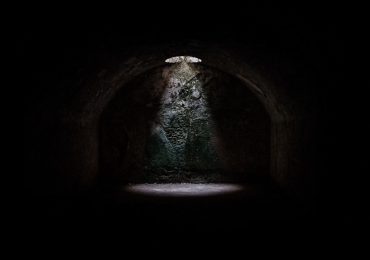The JRB is proud to present a new short story by Sisonke Msimang.
Msimang is the author of Always Another Country: A Memoir of Exile and Home and The Resurrection of Winnie Mandela. This is her first published foray into fiction.
~~~
Paying for Independence
They found her lying on her bed. Washington Mbhozo’s body was on top of hers. He was naked and she was not. It was immediately obvious that she had killed him. She had lodged the knife firmly—expertly even—under his ribs. It had not been so difficult to find the soft spot and drive the knife upwards. Her boy cousins killed goats by slashing their necks—first fondling the pulse and then leaning into the animals. It was always such an intimate embrace. It had been the same when she had killed Washington Mbhozo. She had been close enough to hear his blood course through his veins, to smell the layer of sweat and dust on his neck.
Because she was only thirteen, her perfectly executed stabbing was seen as quite an accomplishment. Even The Men gave her a grudging respect. Even though he had been intoxicated at the time of his murder, Washington Mbhozo was a strong man. He was more than twice her body weight, and when he had finally stopped struggling and had fallen upon her, when she had heard that strange grunt come from his throat, and found herself looking at his ear—the folds of it slightly darker than his yellowy skin—she had felt the weight of each one of his nine stone.
In the weeks after the murder but before the trial, opinions in town were split about whether or not Nyasha should be punished. The Men believed Nyasha ought to be put into the home for disturbed girls that was run by the Dutch ex-nun who had fallen out with the church but had lost neither her love for God nor women. They thought the child should be lashed and imprisoned. Whenever they spoke of the matter—mainly between swigs of beer as they played checkers—they would instinctively touch themselves just underneath their own ribcages. The ones who were most concerned exuded a faint air of panic, as though they had their own Nyashas to worry about.
It was impossible to be a woman in that town without taking Nyasha’s side. Still, The Women generally did not discuss Nyasha’s case when The Men were present. Even when they were alone, without The Men and their views to worry about, they spoke of her in whispers.
Instead of talking too much, The Women worked quietly and efficiently to ensure the girl’s life was not destroyed. She had killed a man any one of them would gladly have murdered and so it was obvious to them that she was the victim. Nyasha could hardly be blamed—Washington Mbhozo had killed her mother and then, as though that wound was not deep enough, he had climbed on top of the girl night after night as she mourned.
For some time before Nyasha killed Washington Mbhozo, the women suspected he had been interfering with her. They knew that if Nyasha turned up at school with a swollen belly, the fault would not be her own. The blame would lie squarely with Washington Mbhozo. They were unsure and they were frightened and so they kept vigil, but did not act. This is the way of things sometimes. Action follows inertia.
But there was no escaping the reality now: Washington Mbhozo was Nyasha’s stepfather and he was also her mother’s murderer and, until his death, he had also been her rapist.
So the women had nothing to say, really, except to discuss how they would go about getting Nyasha out of the town and as far away as possible from her memories of the blood and the silence after he stopped struggling and the awful dead, dead weight of him.
When they found out—after much prodding and pleading—that the child had lain under his corpse for an hour in a pool of his blood until her aunt had discovered them in that position, The Women had not known what to do. They were informed one by one, not as a group, and each response echoed the one that had come before it. It was Margaret’s sister who had finally succeeded in getting her niece to tell her what had happened. She had stood and then immediately sat down again. When she told the next woman she had shrieked involuntarily and then wept. The next two down the chain had merely stood rooted to the spot—speechless and dry-eyed in horror.
In the hours that followed they began to move from where they each were, as though in unison, like a single organism. They gathered to agree on what would be done. The money they had been saving and lending to one another in turns was quickly totalled and they saw they had enough to pay for a good lawyer.
The first thing The Women had done though, had been to ban their husbands and male relatives from attending Washington Mbhozo’s funeral.
As a result, Washington Mbhozo was not buried in the cemetery. He was buried on the outskirts of town, in a small wooded place. Only his brothers, three of his six children, and Nyasha attended the funeral. They appeared not to know who she was and she stood some distance away. She wanted to be sure he was dead and buried. She had come to listen—to hear whether there were any sounds coming from the coffin. After everyone dispersed, Nyasha knelt down and put her ear on the ground, listening. It was still. Washington Mbhozo’s blood was cold and if he had had a soul it had long since escaped. There was nothing under the earth except his bones.
The Women organised a small group to visit the Walsh family to ask for financial support. Nyasha’s auntie Dorothy had been working for them for almost twenty years. Mrs Walsh was initially incensed about her stolen knife. But after Dorothy told her the details of the murder in her calm and even voice, Mrs Walsh wept quietly on the sofa and asked Dorothy to prepare a drink for her. Dorothy fixed a strong bloody Mary—with a stick of celery in it, the way Mrs Walsh liked. She took a long swig herself before patting her mouth with a napkin, smoothing her apron and serving her madam. Once Mrs Walsh calmed down, she quickly took charge, deciding that the princely sum of seventy pounds would need to be secured—secretly—for Nyasha’s legal and other expenses. She had arrived at the figure via a back-of-the envelope calculation that was based on the fees she had paid for a lawyer when the Stirlings next door had accidentally poisoned her prize-winning Simmental bull and then pretended they had nothing to do with it.
Later that week—much too late, really—The Women convened and told Nyasha that she would not be going to jail. A very educated man of the law had been secured and he would make sure she was released.
The Women held Nyasha to their bosoms in a crushing embrace. They wailed and wept and jerked with the Spirit as they prayed on her and around her. They wished they had paid more attention. They begged her forgiveness. They spoke her mother’s name over and over, remembering aloud how much she had loved Nyasha, how deeply she had suffered in childbirth and how the blood she haemorrhaged forged their bond—mother and child on the brink of death had managed to fight and in so doing had given one another life. They said all of this and Nyasha knew it to be true.
‘Why?’ they wailed. ‘If we had protected you from him, there would have been no murder. No mess to clean.’
Nyasha allowed them to think the murder was a tragedy. She could not find the energy to smile—she would have otherwise. Because she would have killed Washington Mbhozo regardless. Even if he had never touched a hair on her head, she knew. The moment she saw her mother’s bloated face, drunk from river water and small-town betrayals, she knew that she would kill Washington Mbhozo. He had killed her mother and so he too would need to be killed.
*
Nyasha’s mother was Margaret. Margaret Nyoni had an on-again-off-again relationship with Washington Mbhozo. She fell in love with him the fourth year after her own husband had left to go to the big city. He had never called or written and at first she had assumed he was dead. But too many others had seen him, and so she understood that he did not want her to find him. This almost crushed her. It would have been better for him to be dead. He had been kind and clever and sometimes he had said things that surprised her. But the economy was in freefall and he was angry and impotent.
She had been a school teacher, but the departure of her husband had signalled the end of her career. A single woman whose husband had left could not be trusted around the children of the community. So she stayed at home. She tried to find work as a cleaner but there were not enough white families to give her work. Soon, she began travelling to Imbi and coming back with food and clothes for Nyasha. On those weekends, the child would stay with Amaiguru—Margaret’s older sister Dorothy—even though the Walshes hated having children around. It disturbed their peace.
Soon there were rumours about Margaret’s trips to Imbi and the money she was bringing home. It did not help that she began to drink. When she drank she was often funny but she was sometimes too sad. And when she was sad any man who showed her kindness could become her lover.
Most of the men stayed away. They were afraid of her tears and her need. Washington Mbhozo didn’t care enough to wonder about her tears. He liked a good time. There was something broken in him too.
He made her worse. And together they slid deeper and deeper into drunkenness. Washington Mbhozo had a wife and eight children to three women. He had once been handsome. There were rumours that his father was Farmer McVee, which explained his yellow skin and his mother’s sadness.
By the time he and Margaret became friends, Washington Mbhozo was a lost cause. Together the pair were wild and sad. Their lives were in the sort of mess that only became commonplace many years after Independence. They were harbingers—planted into that long-ago moment as a warning. For the longest time nobody understood what their tragic story signalled.
None of Margaret’s drunkenness and curled up sadness had mattered to Nyasha. She had learned to clean up after her mother, to mop her vomit and wipe the spittle from her twisted mouth. She had learned to untangle them once they were asleep, so that he wouldn’t crush her—so that her mama could breathe while she dreamed. Nyasha loved her mother more because she knew—as all children do—how desperately she needed her.
On the day Margaret Nyoni died, Washington Mbhozo claimed that he had been drinking at Gulliver’s Travels Tavern all night. Everybody knew that things had got so bad between them that Margaret had finally been forced to flee from him. They had been apart for four months and she had not been drinking for almost a year. Margaret Nyoni had finally become the mother Nyasha deserved. She would never have gone to the river if Washington Mbhozo had not driven her there and forced her to jump in. Nyasha knew this as much as she knew anything. On that hot December night, when the river was at its fullest, after the early rains, Washington had decided that Margaret had to pay for her independence. He determined that the price of her freedom would be her death.
*
Nyasha had been stoic. She and Amaiguru buried Margaret in a white casket that everyone said was extravagant. Nyasha did not know where the money came from and she never asked. She preferred to think of it as a miracle, since Amaiguru worked for the Walshes, polishing their floors and their silver and their door knobs.
Amaiguru had no children of her own but she had raised half the kids in town. When there was a child too many, Amaiguru provided shelter and food. She always seemed to have extra in the house she kept in the township on the outskirts of town. At the time Margaret died, Nyasha had been the eldest of the children in the house. She had been taking care of her mother and a brood of smaller children—the castoffs of various friends and relatives.
About three months after Margaret’s death, Washington Mbhozo had appeared in the bedroom Nyasha shared with two of the smaller children. The children were fast asleep in a cot they shared; Nyasha had been sleeping alone since Margaret’s death. He had moved quickly for someone so drunk. He clamped his hands on her mouth and looked at her as though he were possessed. He was brutal and she had fought silently but ineffectively. She did not want to wake the children. She did not know what to do. She was not ashamed, however; she was incandescent. Washington Mbhozo raped her again two weeks later. The third time, she was ready.
She had known that she would only have one chance; that if she tried and failed then it would be she the villagers would mourn. She had known with all the conviction her heart could muster. She had refused to accept the idea that one man—and this man of all the men that had ever existed in the world—could put two Nyoni women into the ground.
And so when she had seen the kitchen knife sitting on the table at the Walshes house on the Wednesday before the Monday when she murdered Washington, she had grabbed it and hidden it. She had known with a cold and calming certainty that this would be her way out.
The knife had stayed under her mattress. Even when Amaiguru had asked in a panic if she had seen a very expensive knife, because Mrs Walsh was starting to suggest that she was the one who stole it, Nyasha had just shaken her head and said, ‘No,’ in a way that she knew her aunt would believe.
And when Washington Mbhozo came that day with his dirty fingers and his smelly mouth, Nyasha and her knife had surprised him. In fact, the knife had done such a good job that in the trial they had said ‘a lesser implement would never have inflicted such damage,’ and Mrs Walsh had gone white as a sheet sitting in the front row then.
It worked out well in the end: the State let Nyasha off, saying that she was a minor and it was self-defence. The colonial administration did not know what to do with African children who killed African men. Had Washington Mbhozo been a white man, the child would certainly have been hung. Special dispensation may have been sought from the Governor on behalf of the Queen, who would not have liked to know that a child had been killed by her administrators. Nevertheless, the crime would have been punishable by death, to prevent adult Africans from forcing their offspring to murder whites. The law was as much a deterrent as it was a tool of punishment.
The verdict pleased The Women. The Men admitted that it was fair as well—after all, she couldn’t very well be jailed. The whites felt as though justice had been served—in the main because Mrs Walsh was a pillar of the community and she had stood stridently in favour of the child. Some of them suspected Mr Walsh had funded her defence but were too discreet to ask.
Above all, of course, Nyasha Nyoni was quietly proud of herself. She wanted to have her mother back, but if she couldn’t then she would have the head of the man who sent her to her grave.
Amaiguru and her friends quietly arranged to send Nyasha to boarding school. The Women breathed a sigh of relief when she boarded the train. Margaret might rest more peacefully too, now that her death had been avenged and her avenger child was safe. For a few months after the trial, the children were careful to avoid the freshly turned earth at the edge of the forest on the far side of the town. For years to come the trees there leaned away from the barren mound where his coffin had been planted and where grass refused to grow.
~~~
- Sisonke Msimang is a writer and activist who works on race, gender, democracy and politics. She is the author of Always Another Country (Jonathan Ball Publishers, 2017) and The Resurrection of Winnie Mandela (Jonathan Ball Publishers, 2018). Follow her on Twitter.





